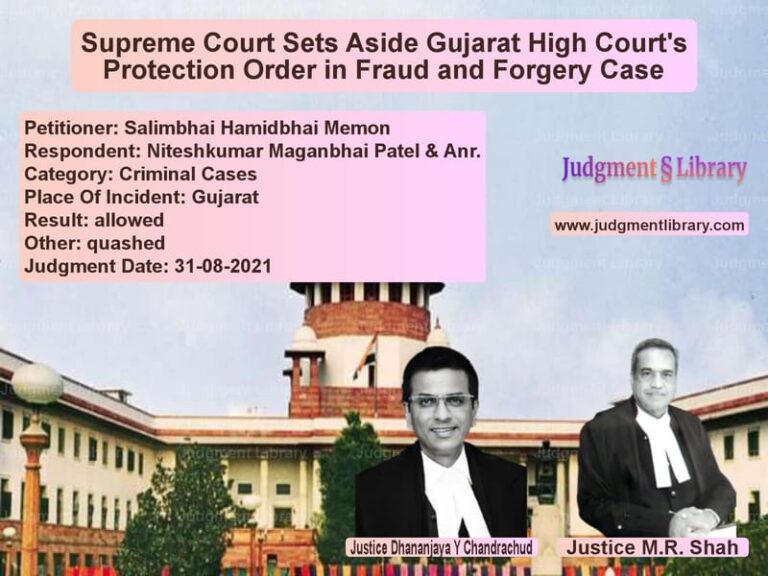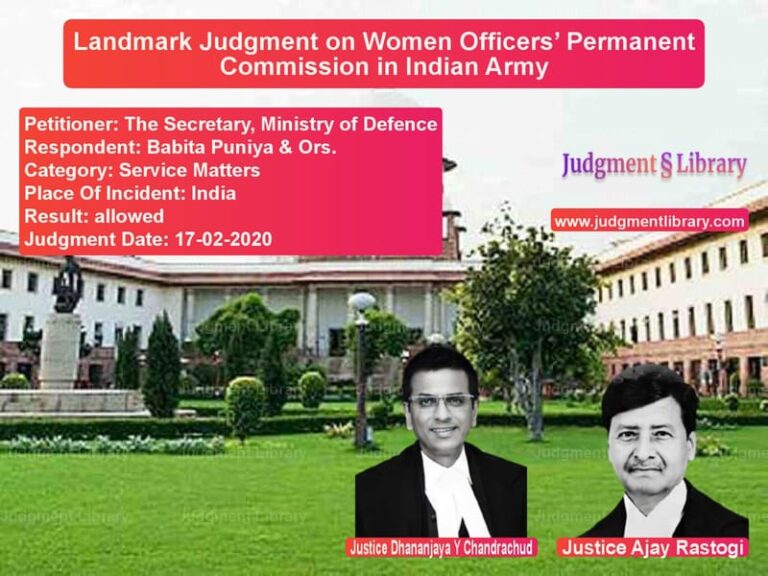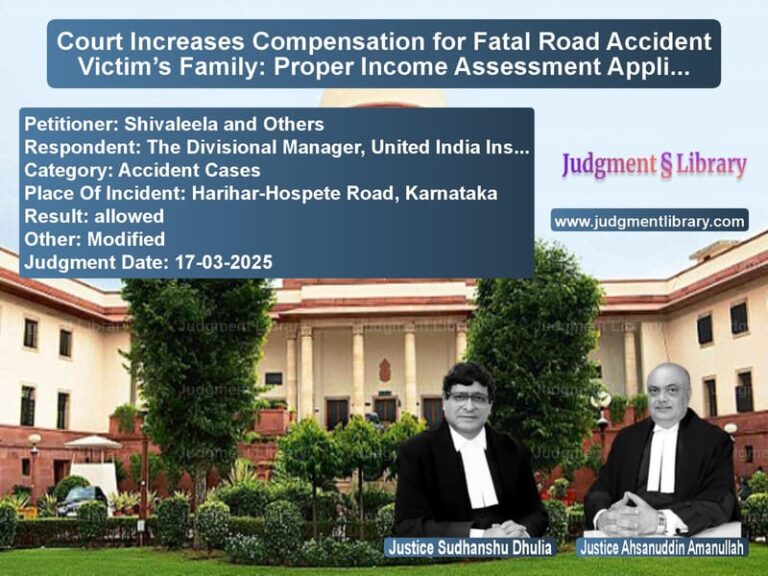Supreme Court Grants Disability Pension to Army Veteran’s Family
Introduction
The Supreme Court of India, in the case of Ex. Gnr. Laxmanram Poonia (Dead) Through LRS. v. Union of India & Ors., ruled in favor of granting disability pension to the legal heirs of an army veteran who was invalided out of service due to a psychiatric disorder. The judgment reaffirms the legal principle that if a disability arises during military service and was not noted at the time of recruitment, it should be presumed to have been caused or aggravated by service.
The ruling is significant as it emphasizes the rights of military personnel and their families in cases where disabilities arise during service.
Background of the Case
The case revolved around the denial of disability pension to Ex. Gnr. Laxmanram Poonia, an army veteran who developed schizophrenia-like psychotic disorder while in service. The key facts are as follows:
- The appellant was enrolled in the Indian Army on 14.09.2005.
- He served at 27 AD Regiment after completing his training.
- In November 2007, he began experiencing severe mental health issues due to overwork and lack of rest.
- He was hospitalized multiple times in military hospitals between 2007 and 2009.
- In October 2009, he was invalided out of service with a 60% disability assessment.
- The Invaliding Medical Board ruled that his condition was ‘neither attributable to nor aggravated by military service.’
- His claim for disability pension was rejected by the Principal Controller of Defence Accounts (Pension), Allahabad.
Following his discharge, Laxmanram Poonia passed away on 01.06.2015. His wife and legal heirs pursued his disability pension case.
Key Legal Issues Considered
The Supreme Court examined the following legal questions:
- Whether the medical condition developed by the appellant was attributable to or aggravated by military service.
- Whether the rejection of disability pension was justified under Army Pension Regulations, 1961.
- Whether the Medical Board’s opinion was conclusive in determining eligibility for disability pension.
Petitioner’s (Appellant’s) Arguments
The appellant’s legal heirs, represented by counsel, argued:
- Laxmanram Poonia was in sound health at the time of his recruitment.
- His mental disorder developed during active military service due to service-related stress.
- As per the Supreme Court’s ruling in Dharamvir Singh v. Union of India, any disability not noted at the time of recruitment should be presumed to be service-related.
- The rejection of disability pension was against the principles of justice and fairness.
Respondent’s (Union of India’s) Arguments
The government, represented by the Additional Solicitor General, argued:
- The Medical Board had determined that the condition was not linked to military service.
- Psychiatric disorders are difficult to detect during recruitment and may have pre-existing causes.
- The decision of the Medical Board should be considered final and binding.
Supreme Court’s Observations
The Supreme Court found several flaws in the rejection of disability pension and observed:
“A soldier is presumed to have been in sound health at the time of enrollment unless recorded otherwise. If a disability arises during service, it must be presumed to have been caused or aggravated by military duty.”
The Court also emphasized:
“The Medical Board’s opinion must be supported by adequate reasons and not be taken as conclusive if it contradicts service records.”
The Supreme Court referred to previous landmark rulings, including Union of India v. Rajbir Singh, which established that disabilities arising during service should be presumed service-related.
Final Judgment
The Supreme Court ruled:
- The rejection of disability pension was set aside.
- The Union of India was directed to grant disability pension to the legal heirs of Laxmanram Poonia.
- The disability pension must be paid within eight weeks.
Significance of the Judgment
This ruling has broad implications for military personnel:
- It strengthens legal protections for soldiers developing disabilities during service.
- It reinforces the principle that service-related disabilities must be presumed unless proven otherwise.
- It limits the reliance on Medical Board opinions that lack supporting evidence.
Implications for Armed Forces Personnel
The judgment provides a legal safeguard for military personnel:
- Soldiers cannot be denied disability pension without clear evidence of pre-existing conditions.
- Families of deceased service members can claim disability pension benefits.
- Medical Boards must provide justifiable reasons when denying disability-related claims.
Conclusion
The Supreme Court’s decision in Ex. Gnr. Laxmanram Poonia (Dead) Through LRS. v. Union of India & Ors. is a landmark ruling that upholds the rights of military personnel and their families. It ensures that service-related disabilities are fairly recognized and compensated. The judgment serves as a precedent for future cases involving disability pension claims in the armed forces.
Don’t miss out on the full details! Download the complete judgment in PDF format below and gain valuable insights instantly!
Download Judgment: Ex. Gnr. Laxmanram P vs Union of India & Ors Supreme Court of India Judgment Dated 22-02-2017.pdf
Direct Downlaod Judgment: Direct downlaod this Judgment
See all petitions in Pension and Gratuity
See all petitions in Public Sector Employees
See all petitions in Judgment by Dipak Misra
See all petitions in Judgment by R. Banumathi
See all petitions in allowed
See all petitions in Modified
See all petitions in supreme court of India judgments February 2017
See all petitions in 2017 judgments
See all posts in Service Matters Category
See all allowed petitions in Service Matters Category
See all Dismissed petitions in Service Matters Category
See all partially allowed petitions in Service Matters Category







